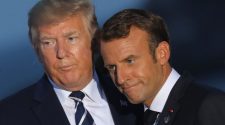WASHINGTON—The U.S. added 28 Chinese entities to an export blacklist Monday, citing their role in Beijing’s repression of Muslim minorities in northwest China, just days before high-level trade talks are set to resume in Washington.
The action, which the U.S. said wasn’t related to trade talks, was nonetheless likely to disturb Chinese officials already incensed over what Beijing sees as U.S. support for an increasingly disruptive pro-democracy movement in Hong Kong.
“I think the Chinese are probably going to see a connection, even if the administration says there isn’t one,” said
Matthew Goodman,
senior adviser for Asian economics at the Center for Strategic and International Studies, a Washington think tank. “It’s going to complicate the discussions this week…the timing is going to be awkward for the Chinese.”
Targets of the action include video-surveillance and facial-recognition giants Hangzhou Hikvision Digital Technology, Megvii Technology Inc. and SenseTime Group Ltd. The decision by the Commerce Department to add the firms to its “entity list” alongside telecommunications giant Huawei Technologies Co.—which was added in May—means suppliers will be barred from providing technology that originates in the U.S. to the Chinese firms without a license.
The newly identified entities “have been implicated in human rights violations and abuses in the implementation of China’s campaign of repression, mass arbitrary detention, and high-technology surveillance against Uighurs, Kazakhs, and other members of Muslim minority groups” in northwest China’s Xinjiang region, the Commerce Department said.
A spokesman said the move was unrelated to trade negotiations.
Western scholars estimate more than one million Turkic Uighurs and other Muslim minorities have been arbitrarily detained in China’s Xinjiang region in the past few years.
The U.S. will also add the Xinjiang Public Security Bureau and 19 subordinate entities to the entity list, along with Chinese firms Dahua Technology Co., IFLYTEK,
Xiamen Meiya Pico Information Co.
, Yitu Technologies and Yixin Science & Technology Co., the Commerce Department document said. The new policy will take effect later this week.
A Hikvision spokesman said the company “strongly opposes today’s decision by the U.S. government” and that the firm “respects human rights and takes our responsibility to protect people in the U.S. and the world seriously.”
The other companies couldn’t immediately be reached for comment.
Responding to the possibility of such a blacklisting in May, a Chinese Foreign Ministry spokesman accused the U.S. of “using national powers to smear and oppress certain Chinese companies. We firmly oppose that and our position is consistent and clear.”
While highly symbolic, the Commerce Department’s action is unlikely to have a major practical impact on the Chinese firms, which rely on plenty of non-U.S. suppliers and have had months of advance warning to diversify their supply chains away from U.S. companies. The export controls also won’t prevent American companies from selling certain goods made outside the U.S. to these firms, as they have been doing with Huawei.
Even before Monday’s developments, people following the U.S.-China trade negotiations said China is unlikely to offer deep concessions on subsidies, state-owned enterprises, forced technology transfer or the sensitive digital-trade issues that were on the bargaining table in the spring—all thorny issues that have bogged down talks for months.
It is more likely the discussions will focus on a more limited set of issues, one of the people said, such as the agricultural purchases, intellectual-property protections, modest relief of Chinese tariffs on America exports and more market access for financial or other foreign firms.
Talks between the two countries for a sweeping trade deal hit an impasse in early May; while talks have continued, little progress has been made toward an accord, and most observers have narrowed their expectations of what negotiators may be able to achieve.
President Trump, speaking Monday at the White House at a signing ceremony for a trade deal with Japan, said there is “certainly a good possibility” of a big trade deal with China, adding that a partial deal is “unlikely.”
But hopes of a broad deal have been complicated by a range of U.S.-China issues that have exposed underlying tensions—including a flap that ensued after the general manager of the NBA’s Houston Rockets tweeted support for the Hong Kong protests. Last week, Mr. Trump publicly called on China to launch an investigation into political rival
Joe Biden,
after a similar request of Ukraine spurred Democrats to launch an impeachment inquiry.
The White House’s top economic adviser,
Larry Kudlow,
told reporters on Monday that the president wasn’t suggesting a probe of Mr. Biden could be a factor in trade talks.
Beijing contends that the U.S. is trying to arrest its advancement on the global stage, and it has responded to U.S. tariffs over the past year with tariffs of its own on American agriculture and a sharp reduction in its farm purchases.
The one recent bright spot has been Chinese agricultural purchases. Chinese buyers bought more than 1.5 million metric tons of U.S. soybeans in the last week of September alone, according to U.S. data, some of the biggest purchases in more than a year.
In August, China purchased nearly $1.5 billion of total agricultural exports, including $945 million of soybeans, according to a Commerce Department report, the best month since January 2018.
The figures are some of the most encouraging since the U.S.-China trade war got under way.
“Soybeans are a barometer for how the whole thing is going,” said Jim Sutter, chief executive of the U.S. Soybean Export Council. “I think we’re just now building up momentum again.”
Even so, these purchases will need to be sustained well after this week’s talks to lead to a sustained recovery for U.S. farmers, a key constituency for Mr. Trump that has been battered hard by the trade war.
U.S. negotiators might need to give ground to keep the purchases coming, including easing some restrictions on Huawei, the Chinese telecommunications giant that the U.S. has identified as a national-security risk, said
Michael Hirson,
the practice head for China at the political-risk consulting firm Eurasia Group.
“I think to keep the ag purchases, the likely concession on the U.S. side is postponing these upcoming tariff increases, and some kind of modest gesture on Huawei,” Mr. Hirson said.
On Oct. 15, the U.S. is set to raise tariffs to 30%—from 25% now—on nearly $250 billion worth of goods. More tariffs kick in Dec. 15, with 15% levies on $156 billion in Chinese imports, including smartphones and other consumer goods.
Deputy-level U.S. and Chinese officials began in Washington on Monday, followed by talks between Mr. Trump’s top negotiators, U.S. Trade Representative
Robert Lighthizer
and Treasury Secretary
Steven Mnuchin,
and China’s top trade envoy, Liu He, beginning Thursday.
—Michelle Hackman contributed to this article.
Write to Josh Zumbrun at [email protected], Kate O’Keeffe at [email protected] and William Mauldin at [email protected]
Copyright ©2019 Dow Jones & Company, Inc. All Rights Reserved. 87990cbe856818d5eddac44c7b1cdeb8

















